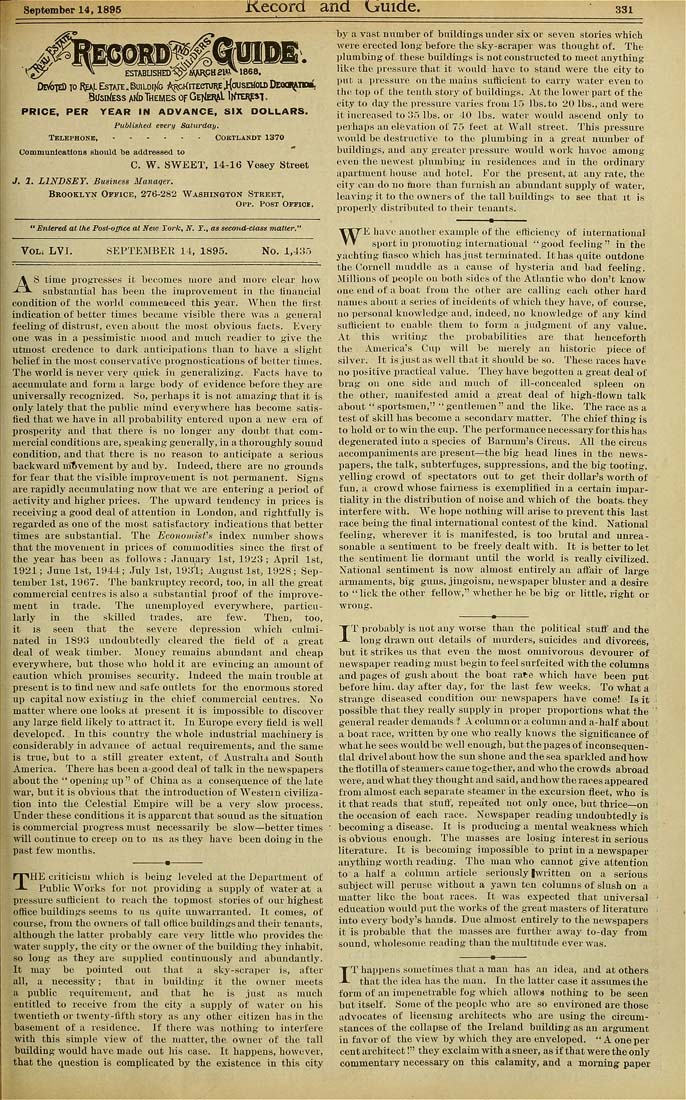Columbia University Libraries Digital Collections: The Real Estate Record
Use your browser's Print function to print these pages.
Real estate record and builders' guide: no. 56, no. 1435: September 14, 1895

Text version:
Please note: this text may be incomplete. For more information about this OCR, view About OCR text.
September 14, 1895 Kecord and uuide. 331 a 9il\ I flea. De^-jeD 10 Re^l Estate. SuiLDif/c 75;ppifrTEeTURE>{ousEi(oLDDEa(Hfiii», Si/SDfess Alto Themes ofGeSer^ IrrtER^I, PRICE, PER YEAR IN ADVANCE, SIX DOLLARS. Published every Saturday. Telephone,......Coetlandt 1370 Uommiudoatlons should be addressed to C. W. SWEET, 14rl6 Vesey Street J. 1. LINDSET. Business Manager. Brooklyn Opkice, 276-282 Washington Street, Opp. Post Office. "Entered at the Post-office at Neiv Torh. N. S., as second-class matter." Vol. LVI. SEI'TESIBER 1-1, 1895. No. l,i:{."> Ati time ptoyTcsses it becomes more jiuil nuire. <;leitr liow siibstautial has been the improvumciit in the Unaucial coudition of the woiUl <'.oiimieuced this year. AVhcu the tirst iiKlicatiou of: better IIdics became visible there was a general feeling of distru.st, even about the mo.st obvious facts. Every oue was in ii pessimistic mood and much readier to ^ive the utmost credence to dark anticipation.^ than to have a slight belief iu the most conservative prognostications of better times. Tbe world ia uever very quick iu generalizing:. Facts have to accuuinlate aud form a large body of evidence before they are universally recognized. So, perhaps it is not amaziufi' that it is ouly lately that the pulilic niiud everywhere bas become satis¬ fied tbat we have in all probability entered upon a new era of prosperity and that there is uo longer any doubt tliat com¬ mercial oouditions are, speak iug geuerally, in a thoroughly sound condition, and that there is no reason to anticipate a serious backward m'^vemcnt by aud by. Indeed, there are uo grounds for fear tbat the visible improyeuient is not permanent. Signs are rapidly accumulating now that we ;ire entering a period of activity and higher prices. The upward tendency iu prices is receiving a good deal of attention in London, and rigbtfuliy is regarded as ouo of the most satisfactory indications that better times are substantial. The Economist'^ index number shows that the movement iu prices of commodities since the iirst of the year has been as follows: Januaiy 1st, ld'23; April 1st, 1921; Juue 1st, 194i; Jtdy 1st, 193^1; August Ist^ 1928; Sep¬ tember 1st, 1967, Tbe bankruptcy record, too, iu ail the great comraercial centres is also a substantial proof of the improve¬ ment in trade. The unemployed everywhere, particu¬ larly iu the skilled trades, are few. Then, too, it IS seen that the severe depression whicb culmi¬ nated in 1893 undoubtedly cleared the field of a great deal of weak timber. Money remains abundant and cheap everywhere, bnt those who hokl it are eviucing au ajnount of caution which promises secnrity. Indeed the main trouble at piesent is to tind uew and safe outlets for the enormous stored up capital now existing iu the chief commercial centres. No matter where oue looks at preseut it is impossible to discover any large tield likely to attract it. Iu Europe cvGvy fieid is well developed. In this country the whole industrial machinery is considerably iu advance of actual requirements, and the same is true, but to a still greater exteut, of Australia and South America. There has been agood deal of talk in the newspapers about the •'opeuiug up" of China as a couseqiience of the late war, but it is obvious that the introduction of Western civiliza¬ tion into the Celestial Empire will be a very .slow process. Uuder these conditions it is apparcut that souud as the situation is commercial progress must necessarily be slow—better times Avill Coutinue to creep on to us as they have been doiug iu the past few mouths. THE criticism which is beiug leveled at the Department of Public Works for not providing a supply of water at a pressiu'C sulficient to reach the topmost stories of our highest ofiice bniidings seems to ns quite uuwarrauted. It comes, of course, trom the owners of tall ofiice buildings aud their tenauts, although the latter probably care very little who i)rovides the water supply, the city or the owner of tbe building they inhabit, so long as they are supplied continuously and abundantly. It may he pointed out that a sky-scraper is, after all, a necessity; that iu building it the owuer meets a public requiremuiit, and that he is just as mnch entitled to receive from the city a supply of water on his twentieth ur tweufcy-fifth story as any other cilizen has in the basemeut of a residence. If there was nothing to interfere with this simple view of the matter, the. owner of tiie tall bnilding would have made out his case. It happens, however, that the question is complicated by the existence iu this city by a vast number of buildings under six or seven stories which M'ere erected long before the sky-scrapei' was thought of. The ])lumbiug of these buildiugs is uot constructed to meet anything like the pressure that it would have to stand were the city to put a. pressure on the mains sufficieut to carry water even fco the top of the tenth story uf buildings. At the lower part of the eity to day tlie pressure varies from 15 lbs.to 20 lbs., aud wore it increased to:").'! lbs. or 10 lbs. water would asceud only to perhaps an elevation of 75 feet at Wal! street. This pressure would be